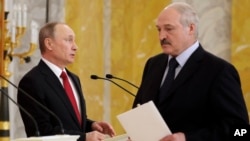The presidents of Russia and Belarus said on Monday they had resolved all disputes over energy, signaling a rapprochement at a time when both leaders are grappling with street protests and the threat of new Western sanctions hangs over Minsk.
At a meeting in St. Petersburg, held while the Russian city was reeling from a deadly bombing on a metro train, Russia agreed to refinance Belarus' debt while Belarus will pay back more than $720 million in arrears for gas supplies.
According to Russian Deputy Prime Minister Arkady Dvorkovich, Russia will also renew oil supplies to Belarus of 24 million tons a year and Russia's Gazprom will give Belarus discounts on gas supplies in 2018 and 2019.
It is an abrupt departure from their recent squabbles and suggests Belarus' authoritarian leader Alexander Lukashenko is moving his country back towards Moscow's orbit after a period of courting closer ties with the West.
"Today we have no differences remaining. We will move ahead, we will strengthen our relations within the framework of the union state," President Vladimir Putin said at a joint news conference.
Putin said their two governments would implement the two leaders' agreement within the next 10 days, and that a "road map" had been agreed for energy cooperation up to 2020.
Russia and Belarus are traditional allies but relations became strained after Russia annexed Ukraine's Crimea peninsula in 2014, a move Lukashenko described as a "bad precedent."
Russia cut the subsidies it uses to keep its one-time Soviet vassal afloat, worsening an economic downturn in Belarus that fueled a wave of unrest against Lukashenko, who has ruled the ex-Soviet state for nearly a quarter of a century.
Lukashenko's blunt suppression of street demonstrations has threatened to undo his efforts to court the West and risks the return of European Union sanctions that were mostly lifted just over a year ago.
The Russian authorities have also cracked down on street protests that broke out in March against corruption.
"We see what's happening around us, and we just want to preserve the stability of Russia and Belarus," said Lukashenko.
"There are too few quiet, calm spots on the planet still left. So we agreed on joint measures to preserve the security of our states."
At least 10 people were killed and more than 20 were injured when an explosion tore through a train carriage in a St. Petersburg metro tunnel in what authorities called a probable terrorist attack.
